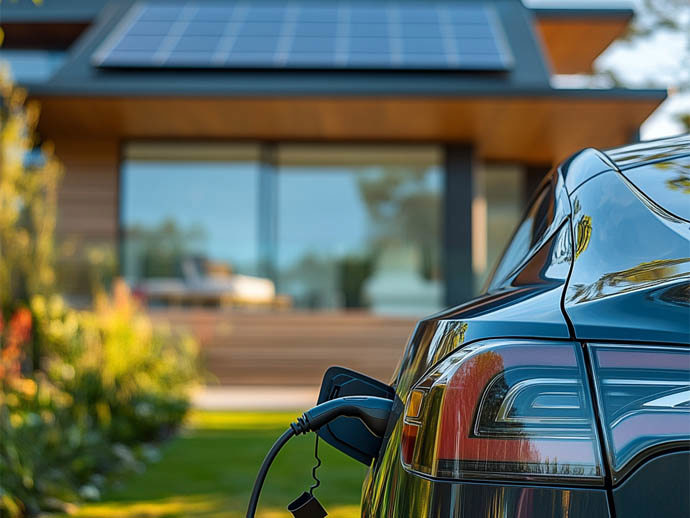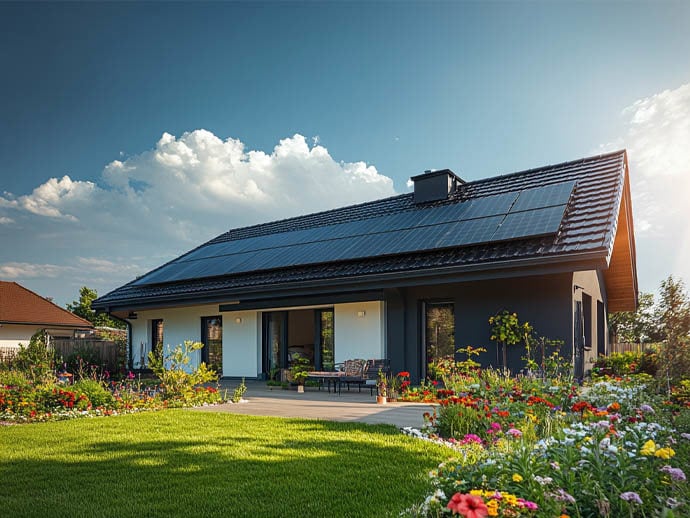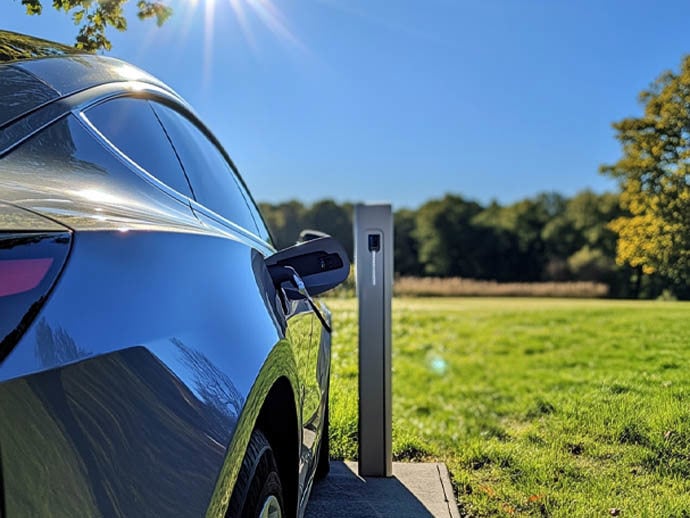
If you’ve got an electric vehicle or solar panels at home, you’re probably thinking about combining the two together. I mean, who can blame you?
However, there will be one question that keeps halting your progression: can you charge an EV using solar panels? Well, yes you can.
In this blog, we’ll explore all you need to know about charging your EV using solar power, including the equipment, environmental benefits, and potential savings.
We discuss:
- Can you charge an electric vehicle with solar power?
- What is solar power charging?
- How much solar power is needed to charge an electric vehicle?
- What equipment do I need to charge my electric vehicle with solar power?
- What’s the best time of day to charge my electric vehicle with solar power?
- The pros and cons of charging an electric vehicle with solar power
- Is solar power the future of electric vehicle charging?
Yes, you can charge an EV with solar power. It’s a brilliant match and will help you claim the crown as the most sustainable driver on your road!
Of course, the amount of energy available to charge an EV will depend on the time of year and weather conditions, and for us in Britain, that means a lot of overcast and rainy weather. So, it’s best to not purely rely on solar power.
We’d still recommend installing a home charger and ensuring a public charging station is available nearby.
Solar panels convert sunlight into electricity. They generate direct current electricity (DC), which is then converted into alternating current (AC) electricity, allowing it to be used to charge things or setback to the grid.
Once you’ve got your solar panels set up, they can be used to charge a range of things, including your electric vehicle. However, it depends on the capacity of your solar panels and the charging requirements of your EV.

Like we said, the size and capacity of your solar panels will determine whether you can fully charge your electric vehicle using solar power alone. Oh, and the weather.
If the sole purpose of your solar panels will be to charge your EV, it’s best to have around 8-12 panels. However, we would advise you to speak to a solar panel professional, as they will give you expert advice.
It also depends on the size of your EV battery. The bigger the battery, the more solar power it requires.
The average UK solar panel system (4.4kWp, 9-16 panels) generates around 9kWh per day (Sunsave). The average EV requires around 35kWh to travel 100 miles, so if you’re travelling around 20 miles a day, a solar panel system will be more than enough to power you for the week.
The only thing you need to charge your EV through your solar panel system is a PV inverter. This will convert the solar power into electricity to allow you to start charging your EV.
The inverter changes the electricity current from DC to AC, which is what all home EV chargers use. It’s worth checking your solar power system, as most already come with this technology.
An additional extra to look out for is a battery storage system that stores the energy generated throughout the day and releases it when you need it. This is important for charging your EV via solar power, as most of the time, you’ll want to charge at night when it's dark.

In the UK (or any country with drastic seasons), the best time to charge an EV is in the summer. During the summer months, solar panels get the most light from 11 am until 4 pm, as this is when the sun is at its highest in the sky.
This is where a battery storage system can come in handy. If you’re out of the house during the day, you’ll be able to charge your car in the evening and still make the most out of prime-time hours.
However, we understand that the summer months are only half of the year. The great thing about solar panels is that they can still generate electricity in cloudy weather, as the sun is out (behind the clouds). However, the electricity generated will be significantly less.
Pros
- Good for the environment - You are using electricity generated from sunlight to charge your electric vehicle. You are undoubtedly one of the most environmentally aware people around.
- Cheaper - Solar power is cheaper than using grid electricity. In fact, once you set up the system, there’s little to no cost in terms of upkeep. According to Sunsave, you can save around £400 a year charging your EV using solar power. You can also sell your extra energy back to the grid and generate a nice profit.
- Energy independence - Charging your EV is no longer reliant on the grid as you are generating your own electricity. This can be beneficial when electricity prices are high or during freaks of nature like power outages.
Cons
- Expensive installation - It’s expensive to both get an EV and install a solar panel system.
- Dependent on the weather - The amount of electricity you can generate to charge your EV is dependent on the weather. The worse the weather, the less electricity you will generate, so I’d expect a decreased output in the winter months.
- Takes longer to charge - Solar panels are much smaller in terms of storage and charging capabilities than your standard charging station, so they take much longer to charge.
If you’re committed to reducing your environmental impact and want to lower your long-term energy costs, charging your EV with solar power is a good choice.
Whether you opt for a couple of solar panels or a full solar array with battery storage, the benefits you’ll see over a five-year period will be worth it.
Although nothing yet has been set in stone, I don’t think it will be long before we start seeing solar panels incorporated into our EVs. Think about how cool that would be!
Looking for more electric vehicle advice? Check out our comprehensive Electric and Hybrid guides, including Best Electric Cars for Families and Electric Car Maintenance.
We are also one of the UK’s largest electric car leasing brokers, offering a range of EV lease deals to suit your every need.
Originally posted: 18th October 2024

